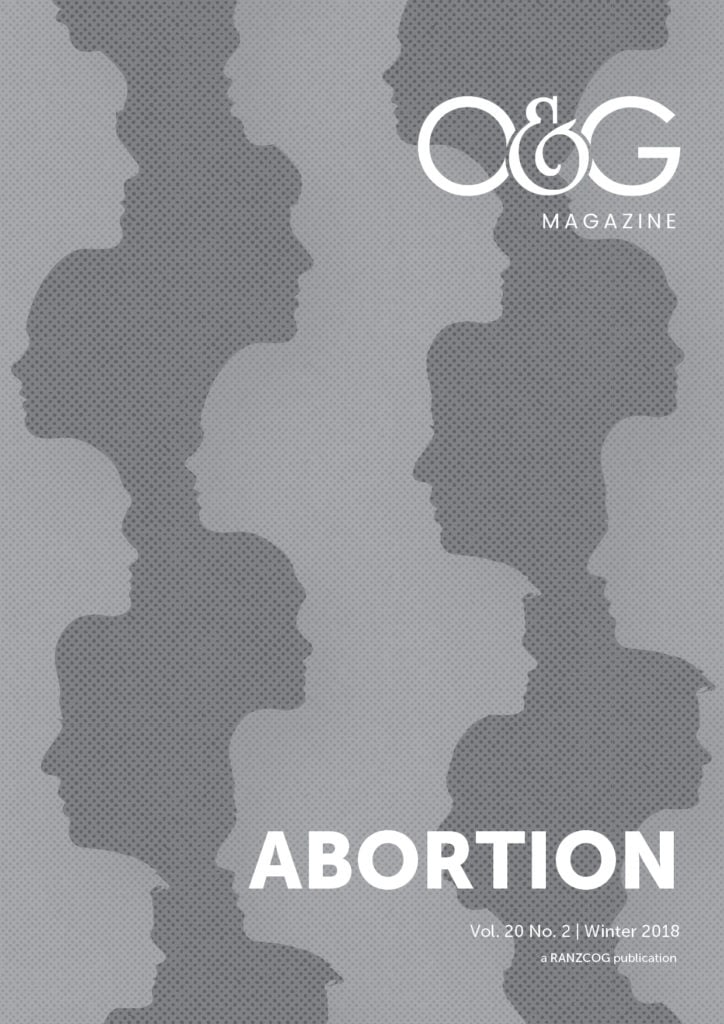A few years ago, I started offering abortion in my obstetric and gynaecology practice. As the service gradually became more well-known, I met women in many different circumstances. I have found my perceptions regarding abortion have changed, as these women have told me of their experiences. Perhaps the most salient insight is that there is no single psychological response to abortion. It is not only that an unwanted pregnancy is an emotionally charged situation. As doctors, we are educated on how to communicate with people in difficult circumstances. Concepts such as ‘breaking bad news’ and the five stages of grief are part of our training and serve us well. In obstetrics and gynaecology, we understand that miscarriage or stillbirth is, for most women, an unalloyed sadness, and this guides us in how to respond. Unplanned pregnancy and the decision to terminate is complex. Doubt, guilt, grief and regret can be tempered by relief, empowerment and determination.
Research on psychological effects
Inherent difficulties with researching the psychological effects of abortion include defining appropriate comparison groups and the extremely emotive nature of the research topic. A meta-analysis of 22 studies with more than 800,000 participants concluded that there was an 80 per cent increased risk in mental health problems, with 10 per cent of this risk attributable to the termination.1 The strongest psychological effects were observed when women who had an abortion were compared with women who had carried a pregnancy (not necessarily unwanted) to term, and when the outcomes measured related to substance use and suicidal behaviour. The effects were reported lower in comparison groups who had wanted, but not received an abortion, and in women who had not been pregnant at all. At the time of publication, there was considerable debate regarding the nature of this meta-analysis, study selection and choice of comparison groups, reflecting the controversial nature of this research.
Conversely, it has been suggested that abortion may have some mental health benefits compared to continuing with an unwanted pregnancy. A 2013 meta-analysis of eight studies found there was no evidence that abortion reduced the risk of mental health disorders, but was associated with small to moderate increases in anxiety, substance abuse and suicide.2
Once women realise they are unexpectedly pregnant, appropriate comparison groups for studies of abortion may be women who choose to continue with unplanned pregnancy, or women who are unable to access abortion. The Turnaway Study reported on 956 women approaching clinics in the US for an elective first-trimester abortion, with no known fetal anomalies or fatal demise, and no maternal health indications for termination.3 Women were split into three groups: women up to two weeks before the gestational limit who had an abortion (near limit group); those up to three weeks beyond the gestational limit who did not have an abortion (Turnaway group); and those who received an abortion in the first trimester. Two-thirds of women in the Turnaway group eventually had a live birth, while one-third either miscarried or terminated the pregnancy elsewhere. The study was conducted across 31 clinics with gestational limits from 10 weeks until the end of the second trimester. There was, therefore, some overlap of gestation across the three groups.
Women enrolled in the Turnaway Study were initially interviewed eight days after receiving or being denied an abortion and then every six months for five years. Study outcomes included six measures of mental health and well-being: two measures of depression, two measures of anxiety, as well as self-esteem, and life satisfaction. The results showed that women who were unable to have an abortion, in particular, those who later miscarried or had an abortion elsewhere, had the most elevated levels of anxiety, and lowest self-esteem and life satisfaction one week after being denied a termination, which quickly improved to levels similar to those in the other groups by 6–12 months. In general, the authors concluded that, while there were some negative psychological consequences of being unable to access an abortion, these differences converged after 6–12 months and there was no difference after five years. The women who had to proceed with unplanned pregnancy after initially seeking an abortion did not differ from other groups. There was no group of women who decided to proceed with an unplanned pregnancy.
A large Danish record linkage study compared risk of psychiatric contact in the nine months before and after first-time abortion, with the risk before and after a desired first childbirth. Using data from 84,000 abortions and 280,000 births, they found there was no increase in psychiatric treatment associated with first-trimester abortion, while there was a significant increase in treatment associated with birth of a first child.4 The wide range of results highlights the difficulties in researching the psychological effects of abortion. It seems reasonable to conclude that there are negative psychological consequences of unplanned pregnancy and abortion, but that these may subside over time. It does not seem that abortion is psychologically protective, but childbirth itself is also associated with significant psychological risk for some women. Given that women terminating a pregnancy may have a wide range of psychological stressors prior to and after their unplanned pregnancy, it is important that every case be considered individually.
Practical considerations
If the best approach is not necessarily ‘breaking bad news’ or explaining the five stages of grief, how should we support these women in often brief clinical settings? It is not appropriate to impose our own beliefs on our patients’ choices and, for example, Tasmanian law provides that practitioners who have a conscientious objection to abortion must provide women seeking termination with a list of prescribed health services from which they can seek advice, information or counselling on the full range of pregnancy options.5 To conclude with a personal observation, prior to medical school, I trained as a psychologist, and if there was one idea that I would take from the training, it is Carl Roger’s concept of unconditional positive regard.6 In this component of humanistic therapy, the central tenet is of acceptance and support of the patient, regardless of the decisions they make. We can facilitate this by supporting their choices and identifying other supports they can access. Abortion is, for many women, associated with short and long-term psychological distress. While this is not invariably the case, providers should be alert to this possibility and provide assistance where they can.
References
- Coleman PK. Abortion and mental health: quantitative synthesis and analysis of research published 1995–2009. The British Journal of Psychiatry 2011. 199, 180-186. doi: 10.1192/bjp.bp.110.077230.
- Fergusson DM, Horwood LJ, Boden JM. Does abortion reduce the mental health risks of unwanted or unintended pregnancy? A re-appraisal of the evidence. Australian and New Zealand Journal of Psychiatry 2013 Sep;47(9):819-27. doi: 10.1177/0004867413484597.
- Biggs MA, Upadhyay UD, McCulloch CE. Women’s mental health and well-being 5 years after receiving or being denied an abortion: a prospective, longitudinal cohort study. JAMA Psychiatry 2017;74(2):169-178. doi:10.1001/jamapsychiatry.2016.3478.
- Munk-Olsen T, Laursen TM, Pedersen CB, Lidegaard O, Mortensen PB. Induced first-trimester abortion and risk of mental disorder. New England Journal of Medicine 2011; 364:332-339 DOI: 10.1056/NEJMoa0905882.
- Tasmanian Government. Reproductive Health (Access to Terminations) Act 2013. Accessed 17 April 2018.
- Wikipedia contributors, ‘Unconditional positive regard’, Wikipedia, The Free Encyclopedia: https://en.wikipedia.org/w/index.php?title=Unconditional_positive_regard&oldid=831542069 (accessed April 22, 2018).






Leave a Reply